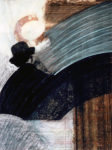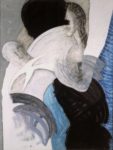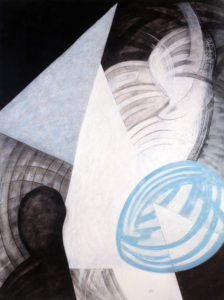16 Fév Christophe GALLAZ – Help, 2002
Christophe GALLAZ
Help, 2002
You are living now, at the beginning of the 21st century. The world is dominated by noise, speed, adversiting, war, contempt, arrogance and crime, and yet we are secretly governed by our intimate solitude in the midst of the crowd, our instinctiveenergy pushing us headlong into absurd tasks, our lack of education compared to the people around us, our ephemeral pleasures and our endless grief, our fear of getting old and our unfitness for the death: systematic disunity between the old and the new.
All of this makes you wonder: Who am I really? What is my true identity? Where are my home, my town and my country? Then you continue: And what if everything I see were just an illusion? What if it were just a series of echoes, masks and reflections? What if the streets around me, the lines of roofs and the backs of the houses were simply parts of the stage set deceiving me into thinking they are a necessary part of where I live? What if my passage througt human history were no more than a rhread from a huge piece of cloth woven together by chance, and if my fellow human beings were just the toys of something beyond the realms of humanity?
If this where you are, just look at the work of Philippe Grosclaude, a series of easily describable images. In one, a row of archways, set in an indefinable architecture. In another, geometric motifs and cubes surrounded by foam, the colour of the primeval sea. Elsewhere, faces that appear to emanate from an archetypal model, with smooth foreheads above aquilin noses. Or simple fluid masses hinting at beings who are absent, dead or were never even born. These are the games of the human presence, constantly appearing and vanishing again, in the midst of its artificial or dreamd-up settings.
Philippe Grosclaude testifies to the difficulty of living in this world. But as he does so, he helps you (and himself) as much as he possibly can. Do you lack those points of reference that define you as a social being in the heart of civilisation? You will find them there, scattered on the canvas. Have you lost some parts of your own slhouette? You will see them nearby. It is to you to survey the peintings and freely to assimilate what you see. Just remember that representations of the past do not faithfully articulate the present, and that the present does not understand itself well enough to point to its own future. This is the game of the present era. Open your eyes exactly as you should, therefore, without expecting too much, but attentively, and you will regain life. This art, like a mirror, will help.
Christophe Gallaz, Help
In Cat.: Philippe Grosclaude, Musée des beaux-arts de la Ville du Locle, 2002


